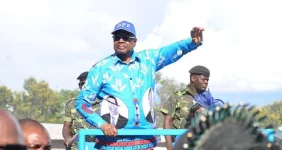Peter Mutharika blew into the 2025 election scene like a political tornado, sending shivers down President Lazarus Chakwera's spine. Known as APM to his die-hard supporters, Mutharika carries a political legacy that runs deep through Malawi's complex political landscape.
With decades of political muscle, APM brings serious heavyweight credentials to the race. He's not just another candidate - he's a seasoned veteran who's worn multiple government hats, from education minister to president. His stint leading the country from 2014 to 2020 gives him street cred that younger candidates can't touch.
The Democratic Progressive Party stands firmly behind him, with a support base that stretches across Malawi. After his brother Bingu's unexpected death, APM promised to keep the party's flame burning bright. He's stuck around through thick and thin, contrary to rumors he'd bail out and vanish to America after losing the 2020 election.
Economic stability marked his previous administration, with international relations humming smoother than ever before. Infrastructure projects like the Area18 interchange shine as proof that he's about action, not just empty talk. His academic chops, including a law doctorate from the United States, add serious intellectual firepower to his campaign.
Rural voters might be his secret weapon. People are frustrated with current living conditions - hunger, sky-high inflation, and economic uncertainty have left them hungry for change. APM's deep connection to rural communities could swing the entire election his way.
But it's not all smooth sailing. At 84, he faces serious challenges connecting with younger voters craving fresh leadership. His past administration wasn't without controversy, with corruption allegations and governance issues hanging like a dark cloud. Internal party divisions and competitors like Kondwani Nankhumwa threaten to fracture his support base.
Critics argue he's living too much in the past, relying on previous achievements instead of addressing current challenges. The political landscape has shifted dramatically, and APM needs to prove he can adapt to new realities and voter expectations.
To clinch victory, he'll need to leverage his strengths while masterfully dodging potential pitfalls. Forming strategic alliances with opposition parties could boost his chances. The upcoming election promises to be a high-stakes political showdown where every move counts.
With decades of political muscle, APM brings serious heavyweight credentials to the race. He's not just another candidate - he's a seasoned veteran who's worn multiple government hats, from education minister to president. His stint leading the country from 2014 to 2020 gives him street cred that younger candidates can't touch.
The Democratic Progressive Party stands firmly behind him, with a support base that stretches across Malawi. After his brother Bingu's unexpected death, APM promised to keep the party's flame burning bright. He's stuck around through thick and thin, contrary to rumors he'd bail out and vanish to America after losing the 2020 election.
Economic stability marked his previous administration, with international relations humming smoother than ever before. Infrastructure projects like the Area18 interchange shine as proof that he's about action, not just empty talk. His academic chops, including a law doctorate from the United States, add serious intellectual firepower to his campaign.
Rural voters might be his secret weapon. People are frustrated with current living conditions - hunger, sky-high inflation, and economic uncertainty have left them hungry for change. APM's deep connection to rural communities could swing the entire election his way.
But it's not all smooth sailing. At 84, he faces serious challenges connecting with younger voters craving fresh leadership. His past administration wasn't without controversy, with corruption allegations and governance issues hanging like a dark cloud. Internal party divisions and competitors like Kondwani Nankhumwa threaten to fracture his support base.
Critics argue he's living too much in the past, relying on previous achievements instead of addressing current challenges. The political landscape has shifted dramatically, and APM needs to prove he can adapt to new realities and voter expectations.
To clinch victory, he'll need to leverage his strengths while masterfully dodging potential pitfalls. Forming strategic alliances with opposition parties could boost his chances. The upcoming election promises to be a high-stakes political showdown where every move counts.












